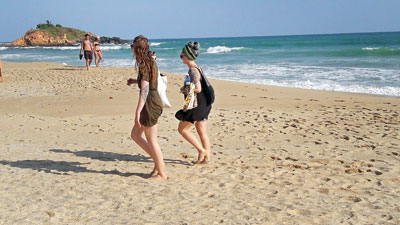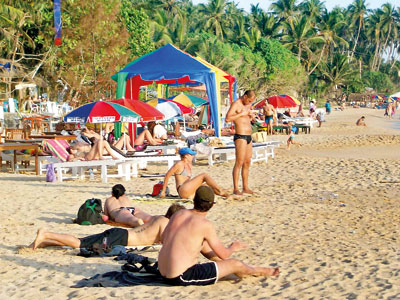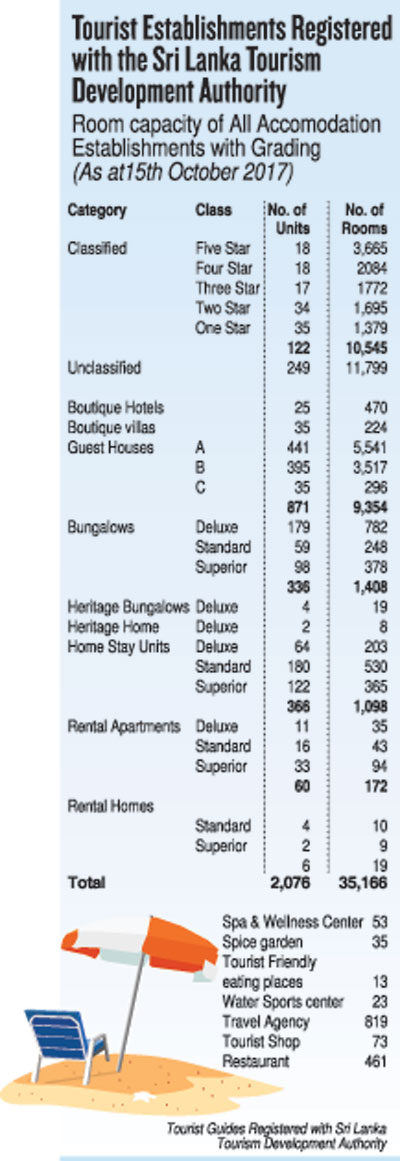News
Govt desperate to protect the tourism golden goose
Dubious tourist guesthouses where vulnerable travellers face being bashed and sexually attacked by drugged and drunken local thugs have been ordered to obtain licences within a year as authorities alarmed by the damage done to Sri Lanka’s tourism reputation rush in safety measures.

There are increasing complaints from foreign visitors over incidents of harassment. Pix by Krishan Jeewaka jayaruk
The Government will increase the Tourist Police force by 300 officers and provide 20 more police posts at tourist hotspots. The police will be temporarily based in renovated containers placed at beaches.
The Sri Lanka Tourist Development Authority (SLTDA) said it would insist that tourist guesthouses and home-stay locations obtain licences.
They will be given one year to bring their services up to a standard acceptable for the granting of a licence from the tourism authority. Until that time they must be registered at the Divisional Secretariat or obtain a company registration. This status can only last one year. Following the granting of a licence they will be subject to annual inspections by the SLTDA.
These measures have been sparked off by an incident on April 8 at Mirissa in which two male tourists were bashed and a female tourist sexually assaulted.
Video footage witnessed by authorities show the two males being set on and severely assaulted by a group of locals. The attackers had been drinking earlier at a nearby hotel. The hotel has been closed down pending investigations.
There are increasing complaints from foreign visitors over incidents of harassment.
A 74-year-old female traveller who for the past 30 years has spent several months every year in Sri Lanka told The Sunday Times that the situation at the beaches at Weligama, Mirrisa and elsewhere along the southern coast had become unpleasant with touts, beach boys and others harassing tourists.
She said the beaches smelled of cannabis as groups of local men hang around, taking drugs and staring at tourists. She said they sometimes become abusive towards female tourists and try to assault men accompanying female tourists of any age.
She added that many so-called hotels were not registered and operated without approval and that they serve liquor despite lacking an Excise Department liquor licence.
Tourists face difficulties when they try to report harassment or acts of harm because there are too few tourist police units and because officers at the area are unable to understand foreign languages. “Sometimes the foreigners have to act and perform before policemen to explain incidents that have taken place,” a police officer in the area disclosed.
“Police officers are often not inclined to write down complaints because they assume that tourists would not return for court cases,” the officer added.
The President of the Southern Hoteliers Association, Shamindra Fernando, said the harassment of foreigners had a direct impact on the tourist industry as travellers would avoid Sri Lanka as a destination.
“Tourist harassment can be stopped by hoteliers if they create their own regulations and practices, ensuring the safety of their guests. We don’t need to wait for government involvement. The problems can lead to loss of business,” he emphasised. He said use of drugs within hotels should be banned and hoteliers should not sell liquor to residents of the area in order to stop drunkards from entering hotels.
Mr. Fernando said the Government should deploy a special police unit comprising Criminal Investigation Department and Special Task Force Officers to stop the spread of drugs at coastal areas.
Hambantota MP Dilip Wedaarachchi (UNP) who is also the State Minister of Fisheries and Aquatic Resources Development said that although tourism brought large revenues to the country little had been done to develop the industry. Mr. Wedaarachchi said armed gangs backed by influential people such as local council members were bringing in cannabis from India using the northern coast and distributing them through hotels along the southern coast.
“When our people get high they become vile and attack innocent tourists, seeking the attention of foreign women, and they destroy the good name of the country and the tourism industry,” he said.
He said the tourist police were inactive and worked in favour of the culprits by telling those seeking to make complaints that witnesses to crimes would soon be travelling back to their countries.
Senior Superintendent of Police J.S. Weerasekara, in charge of the Tourist Police, said he was not in a position to comment, in keeping with instructions from headquarters.
Tourist Police officers competent in English, French and Chinese will be recruited, trained and deployed at the tourism authority’s request, a senior police officer based in the south said. Sri Lanka won the “Most Popular Tourism Destination Award” at the Guangzhou International Travel Fair in China last year, underscoring the importance of securing continued Chinese tourism to this country.
An official of the Coast Conservation Authority said the authority found it difficult to counter illegal hotel construction because of a shortage of staff. Fines of Rs. 5,000-25,000 were levied at the first instance, and a demolition order given, and if the hotels continued operating the fines were increased from Rs, 25,000- 500,000.
The official said more action could be taken against illegal constructions if the authority could employ more officers.
Hotel owners accused the authority of granting approval to hotels backed by persons of influence even when such constructions were in breach of its criteria.
It is learned that while the Excise Department mainly focuses on raids concerning liquor the sale of narcotics thrives in local markets.
Deputy Excise Commissioner Kapila Kumarasinghe admitted facing difficulties due to a lack of field officers.
He said even well-planned raids sometimes met with little success as illegal liquor suppliers and drug dealers took quick action to hide their stores.
Mr. Kumarasinghe said the Excise Department only provides a liquor licence if a hotelier had obtained SLTDA approval, and then too according to the particular category of hotel. Hoteliers were not allowed to sell bulk amounts of liquor.
He added that when a powerful mafia was operating on a large scale along the coast regional Excise officers found it difficult to combat villagers and sought recourse to police support.
There are only 73 Excise officials based in the south, with an average of 12 officials at a regional office, and this lack of staff makes it difficult for the department to combat the spread of drugs and illegal liquor.
SLTDA Director General P.U. Ratnayake said the authority would take every action possible to ensure the safety of tourists, including providing alternate lodgings and air tickets and co-ordinating action with police when tourists who experienced harm came to file a complaint.
He stressed that police must take down complaints.
In response to complaints from owners of small guesthouses that the vetting process for accommodation would be too onerous, he said, “We only ask for three main requirements.
“One is the deed or any other document that shows that the hotel owner legally owns the hotel. Secondly, the registration of the hotel is requested, and thirdly, the Coast Conservation Authority’s approval is asked for when structure of the building and its facilities are considered,” he said.
When a licence to operate is granted the SLTDA would give the hotelier a letter to obtain a liquor licence from the Excise Department.

